The newly launched pension reform will be one year old next December and there are already doubts about whether the economic situation resulting from the war in Ukraine will force the application of an exception that will cushion its budgetary impact in 2023.
The Vice President and Minister of Economic Affairs,
Nadia Calviño
, ruled out last Thursday any change in the pension revaluation formula.
But the invoice that the State should pay to update them in 2023 raises eyebrows in organizations such as AIReF or the Bank of Spain.
Calviño, who assured that for the second half of the year she hopes that inflation will give up its current rampant, insisted in the Congress of Deputies:
"Pensioners can rest easy
. "
But that same day,
Cristina Herrero, president of AIReF
, warned that if in the short term the effects of runaway inflation can be beneficial for the State in aspects such as income from tax collection or debt reduction, the same will not happen. next year.
"The situation changes in 2023 because the spending budget would already be born in a context of high inflation with a fundamental item of spending, which are CPI-referenced pensions: our estimates are that
for each additional point of inflation, spending grows by 1,500 million
, with which we only have to see the level of inflation to see what budgetary impact it would have to revalue pensions with the CPI".
The Bank of Spain plans to update its
macroeconomic forecasts this week and Vice President Calviño assured that the Government will also do so soon.
Today, organizations such as
Funcas
estimate that average inflation, which is the data with which the recent reform updates pensions, will rise to 6.8% this year.
The regulation specifically indicates that the definitive revaluation data will come from the average between the months of December 2021 and November 2022. The impact ratio that AIReF manages on an average inflation of 6.8%,
would mean an increase in spending in pensions of 10,200 million in 2023
.
The figure would be close to covering what a monthly Social Security payroll represents today, which last March amounted to 10,781.75 million euros.
The revaluation of the nearly 10 million contributory pensions is paid month by month in 14 payments (12 ordinary plus two extraordinary) but in its accumulated annual effect it would practically be equivalent to one more payment.
"The net effect on the Social Security budget would be less because income from contributions must be taken into account," explains
Enrique Devesa, a doctor in Economics and an expert in pensions.
"That is why we do not make a forecast of the deficit that it will entail, although the effect is negative if one takes into account that the revaluation is an expense that is consolidated for current and future pensioners while income from contributions is not."
Thus, the inflationary crisis unleashed by the war in Ukraine would have among many other effects on the economy that the new revaluation of pensions approved by Congress with the support of social agents would threaten to
nullify the general effects of the first part of the reform of the system
, which are rebalancing the Social Security accounts.
Last Wednesday, Minister
José Luis Escrivá
announced a reduction in the body's nominal deficit (11,192 million) to below 1% of GDP, although he did not indicate that the tax deficit (the one that measures income minus ordinary expenses of the system) it is more than double: 26,705 million euros (2.22% of GDP).
Devesa understands that, if the current inflation data is confirmed, there would only be a political solution to maintain the meaning of the reform.
"A law like the revaluation is changed with another law, we have already seen it other times and the minimum pensions can be saved."
The fact that the decision is made at the end of the year gives time for a decision.
Mari Cruz Vicente, confederal secretary of Union Action of the CCOO
, rules out advancing a position on the matter, neither for nor against.
She indicates that, as in everything related to the income pact desired by the Government,
workers and pensioners must see the contribution of the State and companies on the table before accepting efforts.
"Revenue agreements do not consist of moderation by only one of the parties."
Conforms to The Trust Project criteria
Know more
Social Security
Ukraine
GDP
Congress of Deputies
Jose Luis Escriva
pensions

